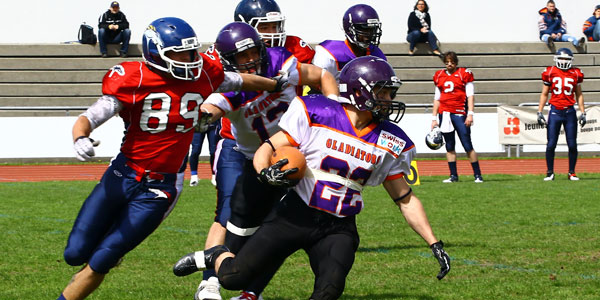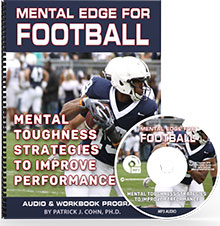
Taking a Growth Perspective with Losses
Is a loss failure? Is a costly mistake failure? It certainly may feel so.
Many football players would consider failure as: throwing an interception in the red zone or fumbling the ball that leads to a score from the opposing team.
It might be missing a tackle for a big yardage play, pushing the ball wide of the goal post on a field goal in the final seconds of a game, having a bad overall game, losing to a win-less team or not getting it going offensively.
Are those mistakes necessarily failure? What if those mistakes happened in a playoff game?
The sting of a costly mistake or lost game can stay with a football player for a long time.
You may have heard the expression, “If you lose, learn” but sometimes it seems impossible. The reality is that losses and mistakes can make you a better player or team but only if you objectively evaluate your play and come up with a plan to avoid those mistakes in the future.
Learning from losses is the mantra of University of Alabama head coach Nick Saban. Saban has compiled a record of 149-22 in 13 years with Alabama and has won five National Championships with the Tide.
Heading into the 2019 collegiate season, Alabama was looking to avenge the loss of the previous year’s National Championship Game and, once again, earn the top spot at the end of the year.
No. 3 ranked Alabama was pitted against No. 2 LSU and the potential playoff implications were significant. LSU dominated the first half jumping out to an early 33-13 lead. Though Alabama scored 28 points in the second half, it was not enough as LSU won with a score of 46-41.
Even though the mistake-ridden loss may hurt Alabama’s playoff chances, Saban didn’t dismiss the opportunity to learn from the loss.
SABAN: “Bottom line is, especially in the first half, we didn’t play very well. We don’t want to waste a failure. There [are] a lot of lessons to be learned from things that we did and didn’t do today. I think that everybody has got to make a commitment to finish the season the right way. We don’t really control our own destiny, but if we finish the season the right way, we can see where it takes us. We’ve been in this situation before. So I think the big thing is everybody needs to learn from the mistakes that we made today and try to get better.”
Saban makes an important point… You can learn lessons from both wins and losses. You just need to evaluate performance objectively, make a strong commitment to learn from mistakes and practice in a manner in which you want to play.
In other words, get over the loss and re-direct your focus on how to improve your game. Don’t waste any opportunity to learn and improve your game.
Grow and Learn to Improve your Game:
After each game, identify two things you did well and make a plan for how you can continue to take advantage of those parts of your game.
Identify two things that went wrong or mistakes you made and determine how you can practice to improve future performances.
“You either win or you learn.” How will you learn and grow from the last game? Dwelling on mistakes doesn’t help you respond with a growth perspective.
Related Sports Psychology Articles
- Harrison Butker Avoids Perfectionism in Football
- The Mindset for Readiness in Sports
- How to Deal with External Noise
*Subscribe to The Sports Psychology Podcast on iTunes
*Subscribe to The Sports Psychology Podcast on Spotify
Download a free sports psychology report to improve your mental game!
Learn more about our one-on-one mental game coaching.
The Mental Edge for Football

Are you (or your athletes) performing inconsistently in games with less confidence in games than in practice? Do you lose confidence easily after a couple of blown plays? Do you become so frustrated with your game that you can’t focus on the next play? If you answered yes to these questions, it’s a good bet that your mental game might prevent you from consistent performance in games.
“The Mental Edge For Football” is a complete brain dump of the TOP eight mental training sessions we teach our football players to help them boost their mental game and improve consistency – from how to mentally prepare for games to performing under pressure to building unstoppable confidence.